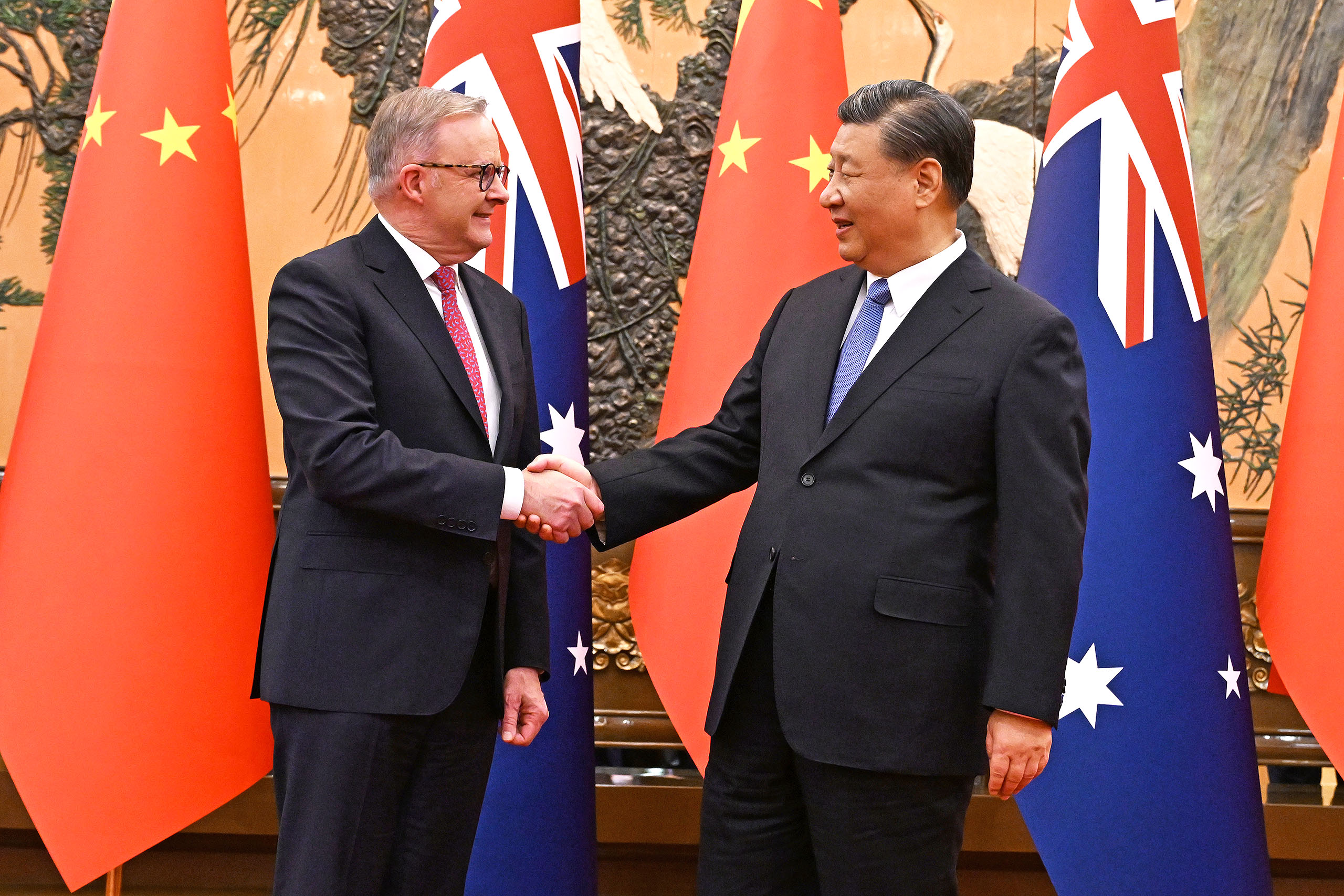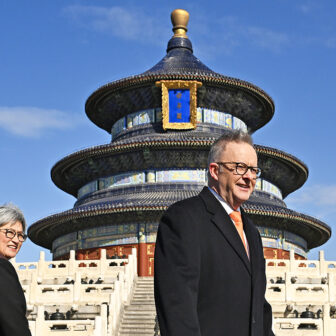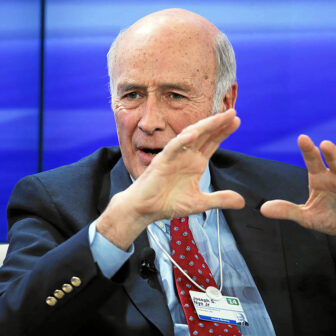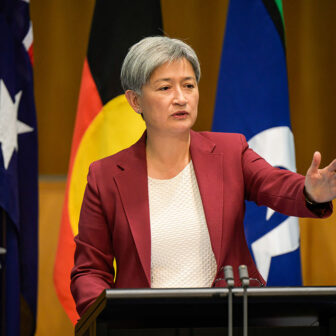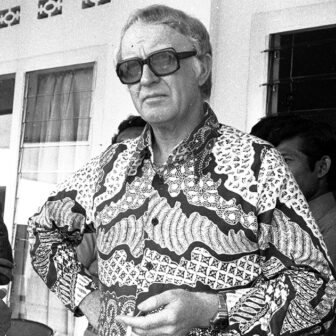A leader of the Australian Labor Party is building improved relations with the People’s Republic of China out of the shambles left by his Coalition predecessor. But there’s a fly in the ointment: an Australian writer playing at spies who’s got himself locked up by the Chinese secret service.
Australian citizen Yang Hengjun’s arrest, imprisonment and suspended death sentence for espionage could draw comparison with the case of Francis James, the eccentric publisher of the Sydney church newspaper the Anglican, who Gough Whitlam managed to spring from a Chinese jail in 1973 after convincing Beijing he was a harmless prankster.
But the two cases are quite dissimilar, especially as the comparison doesn’t give Yang credit for his genuine efforts for liberal reform in China.
As recounted by Japan-based ex-diplomat Gregory Clark, who covered the Francis James case for the Australian, James had concocted an entirely fictitious account of travelling to the Chinese nuclear test site at Lop Nor in Xinjiang and sold it to the London Sunday Times in 1969. After he was exposed by Derek Davies of the Far Eastern Economic Review as having skirted around rather than visited China, James invented another preposterous story and then went openly to China in November 1969. He was promptly arrested as a suspected spy.
Why so reckless? Getting arrested was deliberate, Clark conjectured. “Get into China via the Canton Fair, behave suspiciously, get arrested dramatically and mysteriously, and the world will have no choice but to believe that here indeed is a person who could once have roamed the secret nuclear installations of northwest China,” he wrote.
“True, being arrested by the Chinese police in those days was no joke,” Clark went on. “But he has a plan. Because he behaves outrageously and courts arrest, the Chinese will quickly realise he is a harmless eccentric playing games and throw him out of the country. Being expelled from China will add even more to the James legend.”
But things don’t quite work out that way. “The Chinese decide that he is not mad or playing games, that he really is on some secret spy mission. What James thought would be a short-term escapade ends up as incarceration and interrogation for four years. The joke very nearly ends up as a tragedy.”
Yang’s case could very well turn into a tragedy. His death sentence has been suspended for two years on condition he doesn’t re-offend. How he might spy from a prison cell is a mystery, but Chinese security would no doubt find some evidence if it wanted to. And Yang, fifty-eight, has a large lesion on one of his kidneys that could be renal cancer, treatable if operated on in time. In a previous high-profile case, that of detained Nobel Prize winner Liu Xiaobo, Chinese authorities allowed liver cancer to develop beyond hope of treatment.
Despite five years of detention and hundreds of interrogation sessions, China’s Ministry of State Security could only come up with one plausible accusation of espionage. This involves an operation thirty years ago, in 1994–97, when Yang was working for the ministry itself as an undercover officer in Hong Kong as the territory’s handover from Britain to China was approaching. Back then, according to the limited summary of evidence released with the verdict, Yang passed on forty documents containing Chinese secrets to Taiwan’s intelligence service.
But Yang had long told confidants that his superiors in State Security gave him the job of opening contact with Taiwan operatives to help ensure a smooth transition and had been happy with his trading some low-level information to win confidences. So pleased with his performance had his superiors been that they let him go to Washington with his then wife for two years as a visiting fellow at the Atlantic Council, a think tank, while still on the ministry’s books.
The resurrection of the Hong Kong episode suggests that Yang’s interrogators found no evidence of espionage in the decades since, unless it has been withheld. So the arrest must have been for something else. And the answer surely lies in the evolution of Yang’s career as an academic researcher, popular fiction writer and political blogger, and how State Security, as guardian of the Chinese dictatorship, saw his work as a challenge and threat.
Early on, Yang certainly teased the ministry: not something that should be done lightly given it is perhaps the largest intelligence agency in the world, with an estimated 110,000 staff encompassing foreign intelligence, domestic counter-intelligence and increasingly cyber and industrial espionage. It even has its own think tank, the Institute for Contemporary International Relations, to engage with foreign counterparts and release open-source assessments. At its favoured hotel in central Beijing, troublesome figures are invited in for a “cup of tea” as a warning.
Reflecting the ministry’s staid, bureaucratic character, its cadres are supposed to be pillars of communist rectitude. At the insistence of its former political master, premier Zhou Enlai (the leader Whitlam prevailed on to release James), it has forsworn “honey traps” (sexual entrapment) and doesn’t seem to go in for overseas “wet jobs” (assassinations), at least according to John Byron, the pseudonymous co-author of Claws of the Dragon, a book based on the personal papers of Kang Sheng, Mao Zedong’s spy chief and orchestrator of his purges.
Yang tried to liven up that dour image with a trilogy of spy novels published in Hong Kong and Taiwan around 2004–05. According to those who’ve read them, they contain the mix of sex and murder found in spy books about Western intelligence services. The hero, a Chinese named Yang, is a double-agent in a vicious war between the State Security and the CIA. Smuggled copies gained a wide readership in China.
Yang joined the ministry’s elite intake as a brilliant graduate of Shanghai’s Fudan University, one of the country’s best foreign-studies schools. He received the Hong Kong assignment after a posting to the foreign department of Hainan’s provincial government.
But his role ended with his Washington sojourn. In 1999 his then wife, a professional interpreter and translator, gained a skilled migration visa for Australia. Yang emigrated too, as her dependent. The move appears not to have been a “defection.”
In Australia, as well as writing his spy books, Yang plunged back into academic study, supported by his wife, first at the University of New South Wales and then at the University of Technology Sydney, where he gained a PhD in 2007 for a thesis on political messaging on the Chinese internet, then subject to tightening surveillance and blocking.
Research contacts enabled Yang to develop a huge following for his Chinese-language blogs discussing political reform, says his UTS doctoral supervisor, Feng Chongyi. The large following gained him some income but he also relied on hospitality from friends and contacts. At some point his marriage broke up.
Although his spy books had been “too sensitive for China,” Feng tells me, Yang continued to travel in and out of China, by then as an Australian citizen. One awkward moment came on a visit to Guangzhou in 2011, when local police officers detained him. Uprisings were then sweeping the Middle East in the Arab Spring and China’s security apparatus had been told to nip any local buds. With help from Julia Gillard’s government, Feng got Yang released after four days on the condition that his detention was not publicised.
At their peak, says Feng, Yang’s blogs were followed by about a hundred “Yang Groups” in some fifty Chinese cities. But with Xi Jinping’s ascension as Communist Party secretary in October 2012 the atmospherics started changing. Xi methodically purged all rival factions, including the Shanghai faction of former leader Jiang Zemin and the Communist Youth League faction of predecessor Hu Jintao (who was later frogmarched out of the 2022 party congress that gave the green light for Xi’s indefinite rule).
Xi also cracked down on civil society: lawyers, academics, media outlets, non-government organisations. With his blogging career faced with ever-tightening controls, Yang became noticeably more cautious in what his writing and speaking, according to a foreign correspondent he used to meet in Beijing. His high-level party contacts, including former vice-president Zeng Qinghong, a key lieutenant to Jiang Zemin, were themselves on the outer.
Yang had also embarked on a relationship that raised questions among his following. His new wife, Yuan Ruijuan (also known as Yuan Xiaoliang), had been labelled a “patriotic blogger” — or, more disparagingly, a wumao (fifty-cent warrior) for the half-yuan these bloggers were supposedly paid for each post supporting the official line. Her reputation sat uneasily with Yang’s long-time aim of political opening. Some wondered whether Yang had been playing both sides of China’s internal divide.
Nonetheless, Yang was in the sights of State Security. The contacts he had made with Zeng Qinghong, a former vice-premier who had been a key lieutenant of Jiang Zemin, would have been enough to ensure that. “The CCP reforming wing under Zeng embraced globalisation whole-heartedly and pushed for alliance with the West,” says Feng. “Zeng even went so far as to find an exit for the CCP.”
In March 2017 Feng Chongyi was himself detained during a research trip in Guangzhou. Before pressure from Canberra and his university secured his release, Feng says he was questioned intensively about Yang’s activities and connections. “They said: Women hui shoushi ta! We will get rid of him!” Feng recalls.
Feng then helped Yang get a two-year visiting fellowship at New York’s Colombia University, his income to be augmented by informal daigou trading of American luxuries to China. After the fellowship ended in January 2019, Yang and his second wife, heading back to Australia, made the fateful decision to visit relatives on the way. Unlike Francis James, it was not a showdown gesture: Yang must have thought the State Security officers in his intake, by then in senior ranks, would keep a lenient eye on him.
“I told him not to go back to China,” says Feng. “He said, if they want to take me, they would have done it long ago.”
Yang’s arrest may partly have been precautionary, aimed at silencing a potentially influential figure ahead of two big anniversaries coming up in 2019: the centenary of the 4 May 1919 student uprising over the foreign concession ports reaffirmed in the Versailles Treaty, and the thirtieth anniversary of the Tiananmen massacre.
China’s relations with US-aligned nations were already spiralling downwards. A month earlier, Canada had arrested Huawei’s heiress-apparent Meng Wanzhou on a US warrant for breaking sanctions on Iran. In return, two Canadians working in China had been arrested, effectively as hostages. Members of the Five Eyes intelligence group, which includes Australia, were blocking Huawei from their 5G mobile networks on suspicion the technology could be used for Chinese espionage or sabotage. The party and State Security had added to the deteriorating atmosphere with a new intelligence law requiring all Chinese citizens and enterprises to cooperate with intelligence services when asked.
In Australia, Malcolm Turnbull’s government had enacted new laws on foreign influence while Yang was in New York. A month after his detention Canberra blocked the Chinese businessman Huang Xiangmo, a permanent resident, from re-entering Australia because of payments to politicians allegedly to build pro-China sentiment.
Yang was in contact with Australian officials preparing the anti–foreign influence crackdown. In New York he appears to have engaged with Boxun, a US-based website and news aggregator that promotes democracy and human rights and exposes alleged corruption in China. Blocked in China itself, Boxun has been subject to cyber-attacks attributed to Beijing. Its founder, Meicun “Watson” Meng, has strongly defended Yang against his latest charges.
Yang’s harsh sentence has undermined the feeling in Canberra that relations with China, though never expected to be warm, were at least unlikely to deliver more shocks. The hope, no doubt, was that Yang would be released after sentencing for time served.
To Canberra’s China hawks, the sentence suggests that Beijing wants Australians to be a bit afraid. And the court’s two-year good behaviour: did that apply to the Australian government, they wonder, as well as Yang?
But Richard McGregor, the China specialist at Sydney’s Lowy Institute and author of widely praised book, The Party, plays down the idea that Beijing is sending a message to Australia. “It’s less about Australia and more about them,” he tells me. “On the one hand, the MSS [State Security] is likely largely indifferent to the deleterious impact Yang’s verdict will have on relations with Australia. But you could imagine that State Security deliberately demanded the harshest sentence possible as a warning to pro-democracy activists that they are risking their lives.”
For State Security, foreign relations are mere collateral damage. So is economic confidence. After a revised anti-espionage law introduced last July expanded the range of activities that can be considered espionage, raids targeted US-linked consultancy and due-diligence firms.
As the well-informed Hong Kong journalist and academic Wang Xiangwei has pointed out, State Security has gone public with its warnings, launching a WeChat account last August. “Since then, it has boldly asserted itself not only on espionage matters but also on national and international topical issues ranging from China–US relations to economic subjects, including one in which it warned against badmouthing China’s economic growth prospects,” Wang wrote.
Then, late last year, State Security put out posts blasting people who were bearish about China and “badmouthing” China’s economic growth prospects, Wang said. A few weeks later, in late January, it laid out ten conditions — mainly concerning national security, state secrets and anti-espionage law — that could lead to questioning by its agents.
State Security is unlikely to be doing this without Xi’s firm approval. Minister Chen Yixin is a longtime associate of Xi — so close that he is believed to be working on a new chapter of “Xi Jinping Thought on Socialism with Chinese Characteristics for a New Era,” the official ideology that ranks Xi with Mao. A “pillar” of state security seems likely to join existing pillars of the economy, diplomacy, military, environment, legal affairs and culture in the official document.
Without a signal from Xi, no one in Beijing is likely to resist the expanded ministry. “In any political system it’s difficult to push back against the internal security service,” says Lowy’s McGregor. “Eventually with wolf-warrior diplomacy there was a top-level political intervention and it largely stopped. So far, the MSS’s role seems very much in line with the direction Xi Jinping has set for the country. The only incentive in China is to exceed what you think the leader wants.”
In the meantime, Anthony Albanese is no Gough Whitlam, and Xi Jinping is no Zhou Enlai, and for the China of 2024, unlike in 1973, the Russians are its second fiddle and the Americans fearful of its rise. The best hope for Yang appears to be an effort to stress his precarious health and, unfairly as it may be, downplaying the seriousness of his challenge to the Party.
The MSS cadres are unlikely to know James Thurber’s 1939 story “The Secret Life of Walter Mitty” or the 1947 Danny Kaye movie, but they might have seen the 2013 remake with Ben Stiller. •
